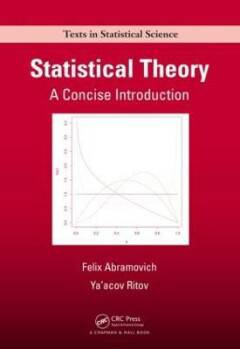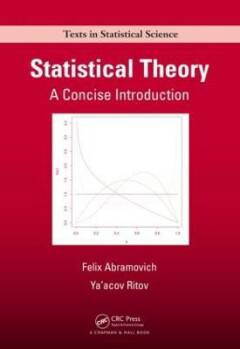
- Retrait gratuit dans votre magasin Club
- 7.000.000 titres dans notre catalogue
- Payer en toute sécurité
- Toujours un magasin près de chez vous
- Retrait gratuit dans votre magasin Club
- 7.000.0000 titres dans notre catalogue
- Payer en toute sécurité
- Toujours un magasin près de chez vous
Description
Designed for a one-semester advanced undergraduate or graduate course, Statistical Theory: A Concise Introduction clearly explains the underlying ideas and principles of major statistical concepts, including parameter estimation, confidence intervals, hypothesis testing, asymptotic analysis, Bayesian inference, and elements of decision theory. It introduces these topics on a clear intuitive level using illustrative examples in addition to the formal definitions, theorems, and proofs.
Based on the authors' lecture notes, this student-oriented, self-contained book maintains a proper balance between the clarity and rigor of exposition. In a few cases, the authors present a "sketched" version of a proof, explaining its main ideas rather than giving detailed technical mathematical and probabilistic arguments. Chapters and sections marked by asterisks contain more advanced topics and may be omitted. A special chapter on linear models shows how the main theoretical concepts can be applied to the well-known and frequently used statistical tool of linear regression.
Requiring no heavy calculus, simple questions throughout the text help students check their understanding of the material. Each chapter also includes a set of exercises that range in level of difficulty.
Spécifications
Parties prenantes
- Auteur(s) :
- Editeur:
Contenu
- Nombre de pages :
- 240
- Langue:
- Anglais
- Collection :
Caractéristiques
- EAN:
- 9781439851845
- Date de parution :
- 25-04-13
- Format:
- Livre relié
- Format numérique:
- Genaaid
- Dimensions :
- 157 mm x 236 mm
- Poids :
- 557 g

Les avis
Nous publions uniquement les avis qui respectent les conditions requises. Consultez nos conditions pour les avis.






